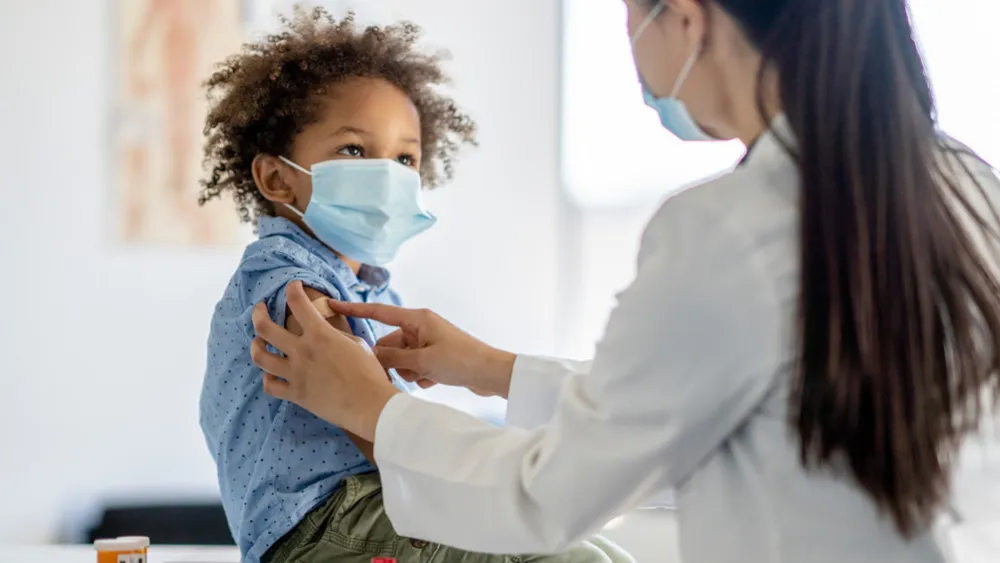
Family Health
Why Give Kids the COVID-19 Vaccine? A Methodist Pediatrician With Kids of Her Own Weighs In
Published: June 20, 2022


With the approval of the Pfizer-BioNTech and Moderna COVID-19 vaccines for children ages 6 months to 5 years, millions of parents are breathing a sigh of relief as their children are now eligible for vaccination.
Still, many parents have questions or doubts. With that in mind, we asked Methodist Physicians Clinic pediatrician Natalie Fleming, MD – who has two children of her own – about common questions pediatricians are hearing.
WHY IS THE COVID-19 VACCINE SO IMPORTANT FOR KIDS AND FAMILIES?
I endorse the COVID-19 vaccine both for my patients, and now, excitingly, for my own children. Here’s why: The vaccine can prevent severe infection or hospitalization in kids – and, yes, kids can become seriously ill from COVID-19. They also can become infected with COVID-19 as easily as adults, and they are just as contagious as adults. The vaccine will help limit family and community spread while helping protect those who are immunocompromised.
Additionally, getting vaccinated can help get us back to doing the things we enjoy. Many families have experienced the disappointment of vacations, holidays and other plans ruined due to infection. These vaccines will allow families to resume more normal activities while decreasing the amount of time kids are missing at school, day care and other activities due to infection or quarantine policies. The vaccine gives kids more opportunities to just be kids.
WHY DID IT TAKE LONGER FOR A CHILDREN’S DOSE OF THE VACCINE TO BE APPROVED?
I know it’s frustrating that the vaccine trial and approval process for the youngest kids has taken this long. But all pediatricians will tell you that our patients are not just little adults. They have their own specific physiology and immune function – and they require unique dosing and scheduling when it comes to vaccines. It takes time to get it right. I support the time and effort taken to properly research the vaccine for young people. The approved vaccines boast specifically small doses to minimize side effects while continuing to be effective again COVID-19.
IS THE COVID-19 VACCINE SAFE FOR KIDS? HOW DO WE KNOW?
All vaccine side effects are closely monitored by the Vaccine Adverse Event Reporting System (VAERS). Many reports you may have seen of serious side effects and even death following vaccination are misrepresentations of data or outright misinformation.
The vaccine is safe for children, and here’s an example of scientific safeguards at work: As adolescents started to become further vaccinated last summer, some mild cases of myocarditis and pericarditis (two types of heart inflammation) were noted mostly in adolescent males after their second dose. With this finding, the Food and Drug Administration (FDA) called on Pfizer-BioNTech to increase its trial size for the 5- to 11-year-old age group, which it did. During the trial for that group of children, there were no reported cases of pericarditis or myocarditis. There also have been no cases of pericarditis or myocarditis in the younger age group during trials.
ARE THESE VACCINATIONS TWO- OR THREE-DOSE SERIES? WHAT SIDE EFFECTS CAN CHILDREN EXPECT?
The Pfizer-BioNTech vaccine for children 5 and older is a two-dose series dosed three to eight weeks apart. For kids age 6 months to 4 years, the vaccine is a three-dose series – the first and second doses are three to eight weeks apart, and the third dose comes at least eight weeks later.
The Moderna vaccine for kids ages 6 months through 5 years is a two-dose series gives four to eight weeks apart. The vaccine has not been approved for children age 6 to 17.
Booster recommendations vary by vaccine and a child’s age and overall health. For more information about booster recommendations, visit the Centers for Disease Control and Prevention’s pages on the Pfizer-BioNTech and Moderna vaccines for kids.
Possible side effects for children are similar to those seen with other childhood vaccines. They include:
- Fever
- Fatigue
- Fussiness
- Muscle soreness at the injection site
- Decreased appetite
HOW CAN I PREPARE MY CHILD TO BEST HANDLE ANY SIDE EFFECTS?
You know your child best. If they do well with preparation and explanation, tell them what the plan is and what to expect. Have acetaminophen or ibuprofen on hand to treat a possible fever or injection site discomfort.
Not all children benefit from knowing about a shot ahead of time. If yours suffers from anxiety when it comes to doctor’s visits, it may be best to simply have a plan for a small reward afterward.
DO YOU RECOMMEND ONE VACCINE OVER THE OTHER? SHOULD HAVE MY CHILD RECEIVE THE PFIZER OR THE MODERNA VACCINE?
When looking at the data, parents may note that the effectiveness of both vaccines is lower than the numbers we initially saw when the adult vaccines came out. This is because these vaccines were trialed during the Omicron variant surge, which resulted in widespread breakthrough COVID-19 infection. Both vaccines work to decrease hospitalization and long-term side effects should a patient be infected with COVID-19. The current data also show a higher effectiveness for the Pfizer vaccine. This number may be falsely elevated as the trial involving the third dose of the Pfizer vaccine is newer, and therefore there’s still time for these trial participants to have breakthrough infections.
Unlike other age groups that were able to receive their vaccines at pharmacies and vaccine clinics, most children in the 6 month to 5 year age group will need to receive their vaccines in their pediatrician’s office. This is because their shots will be given in the leg and require different positioning than for adults and older children who can receive vaccines in their arms. Ultimately, I recommend whichever vaccine is available to your child, as they’ve both been proven safe.
COULD CHILDREN SUMMER ACTIVITIES OR VACATIONS BECAUSE OF THEIR SIDE EFFECTS? SHOULD WE WAIT UNTIL CLOSER TO THE SCHOOL YEAR TO GET THEM VACCINATED?
It’s possible that children may miss out on activities for a day or so due to side effects like fever or fatigue. Of course, this is far better than missing over a week of plans due to a COVID-19 infection.
I recommend getting your child vaccinated as soon as possible so they can start building immunity in preparation for school and other get-togethers.
ARE ANY SIDE EFFECTS KNOWN TO FOLLOW A GENETIC LINE (FOR EXAMPLE, MOM EXPERIENCED A FEVER, SO A CHILD MAY, TOO)?
Side effects for the vaccine have not been determined to be genetic. Just because you experienced a certain symptom does not mean your child will have the same experience.
ARE THERE ANY CHILDREN WHO SHOULD NOT GET THE VACCINE?
If your child has an immunodeficiency, is on a medication that impacts their immune system, has a blood clotting disorder or is on a blood thinner, talk with their primary care provider prior to giving them the vaccine. If your child has allergic reaction to the first dose of the Pfizer-BioNTech COVID-19 or Moderna vaccine, be sure to consult with their provider prior to their next dose.
DO KIDS STILL NEED TO WEAR MASKS AFTER THEY’RE VACCINATED?
This question doesn’t necessarily have a simple yes or no answer. It’s important to remember that while wonderfully effective, vaccines are just one tool in the fight against COVID-19. Masks are another tool that can help keep your family and others safe.
If community transmission levels of COVID-19 are high, you should wear a mask while indoors in public. Even if transmission levels are classified as medium, you may need to wear a mask if you’re at risk for severe illness. You can take the initiative by monitoring your community’s transmission level and talking with your health care provider about steps you should take to keep your family healthy.
CAN A CHILD GET THE COVID-19 VACCINE AND OTHER VACCINES AT THE SAME TIME?
A child can certainly get their COVID-19 vaccine and their regularly scheduled vaccines at the same time. Please ask your child’s pediatrician about the COVID-19 vaccine at your child’s next well visit.
Don’t Hesitate To Reach Out
As a parent, I know how scary and frustrating the past two years have been. As a doctor, I’m encouraged by the steps we’ve all taken to keep our families and community safe. The COVID-19 vaccine for children is the next such step.
When it comes to COVID-19 and vaccination, you’re right to have questions and concerns. Don’t hesitate to reach out to your child’s provider. We’re committed to being your partner in keeping your kids happy and healthy.
More Resources
- Dr. Natalie Fleming shares how vaccination during her pregnancy helped keep her infant safe.
- Read the latest information and stories regarding COVID-19.
- Find a Methodist pediatrician.


